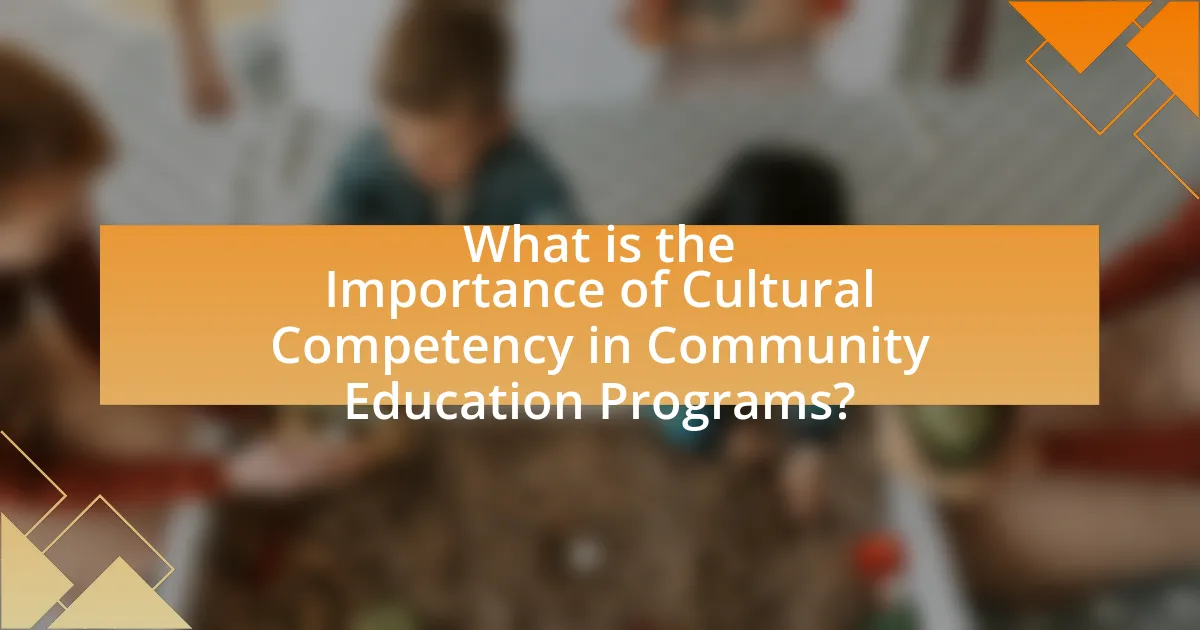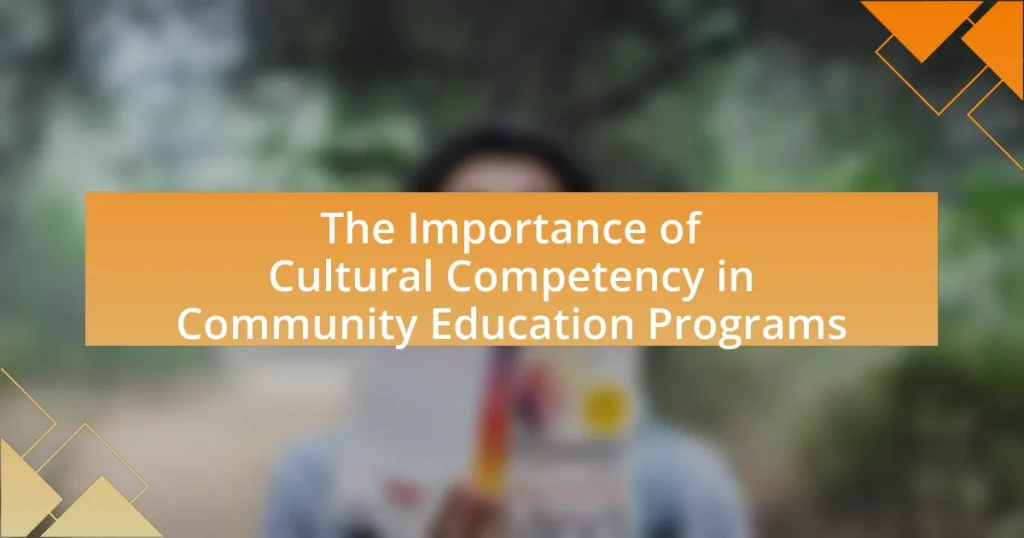Cultural competency is a vital component of community education programs, enhancing their effectiveness by making them relevant and accessible to diverse populations. This article explores the significance of cultural competency, detailing how it influences community education by improving engagement, participation, and educational outcomes. Key elements of cultural competency include awareness of cultural differences, knowledge of diverse practices, effective communication skills, and adaptability in teaching methods. The article also discusses the challenges educators face without cultural competency, the impact on educator-student relationships, and strategies for implementing and maintaining cultural competency in educational settings. Ultimately, it highlights the long-term benefits of culturally competent programs, including improved academic performance and stronger community trust.

What is the Importance of Cultural Competency in Community Education Programs?
Cultural competency is crucial in community education programs as it enhances the effectiveness of educational initiatives by ensuring they are relevant and accessible to diverse populations. By understanding and respecting cultural differences, educators can tailor their approaches to meet the specific needs of various communities, thereby increasing engagement and participation. Research indicates that culturally competent programs lead to improved educational outcomes, as they foster an inclusive environment that values diverse perspectives and experiences. For instance, a study by the National Education Association highlights that culturally responsive teaching practices can significantly boost student achievement and retention rates among minority groups.
How does cultural competency influence community education?
Cultural competency significantly influences community education by enhancing the effectiveness of educational programs tailored to diverse populations. When educators possess cultural competency, they can better understand and address the unique needs, values, and perspectives of various cultural groups, leading to increased engagement and participation in community education initiatives. Research indicates that culturally competent programs improve learning outcomes and foster a sense of belonging among participants, as evidenced by a study published in the “Journal of Community Education” which found that culturally responsive teaching methods increased student retention rates by 30% in multicultural settings. This demonstrates that cultural competency is essential for creating inclusive educational environments that promote equity and accessibility in community education.
What are the key elements of cultural competency in education?
The key elements of cultural competency in education include awareness of cultural differences, knowledge of diverse cultural practices, skills for effective communication across cultures, and the ability to adapt teaching methods to meet the needs of all students. Awareness involves recognizing one’s own cultural biases and understanding how these can affect interactions with students from different backgrounds. Knowledge encompasses understanding the histories, values, and beliefs of various cultures, which informs curriculum development and teaching strategies. Skills for effective communication include active listening and the ability to engage with students in a culturally responsive manner. Finally, adaptability in teaching methods ensures that educators can modify their approaches to accommodate the diverse learning styles and needs of their students, fostering an inclusive educational environment.
How does cultural awareness enhance learning outcomes?
Cultural awareness enhances learning outcomes by fostering an inclusive environment that respects diverse perspectives and experiences. This inclusivity leads to increased engagement and participation among learners from various backgrounds, as they feel valued and understood. Research indicates that culturally responsive teaching methods can improve academic performance; for instance, a study published in the “Journal of Educational Psychology” found that students who experienced culturally relevant pedagogy showed a 20% increase in test scores compared to those who did not. By integrating cultural awareness into educational practices, educators can better address the unique needs of their students, ultimately leading to improved learning outcomes.
Why is cultural competency essential for educators?
Cultural competency is essential for educators because it enables them to effectively teach and engage students from diverse backgrounds. This competency fosters an inclusive learning environment, which is crucial for student success, as research indicates that culturally responsive teaching improves academic outcomes and reduces achievement gaps. For instance, a study published in the Journal of Educational Psychology found that students who perceive their teachers as culturally competent are more likely to participate actively in class and demonstrate higher levels of motivation. Thus, cultural competency not only enhances the educational experience but also promotes equity in education.
What challenges do educators face without cultural competency?
Educators face significant challenges without cultural competency, including ineffective communication, misunderstanding of student needs, and inability to create inclusive learning environments. Ineffective communication arises when educators lack awareness of cultural differences, leading to misinterpretations and conflicts. Misunderstanding student needs occurs as educators may not recognize the diverse backgrounds and experiences that shape students’ perspectives, which can hinder academic engagement and success. Additionally, the inability to create inclusive learning environments results in alienation of students from different cultural backgrounds, negatively impacting their participation and overall educational experience. Research indicates that culturally competent educators can improve student outcomes by fostering a sense of belonging and respect, which is essential for effective teaching and learning.
How can cultural competency improve educator-student relationships?
Cultural competency can significantly improve educator-student relationships by fostering mutual respect and understanding. When educators possess cultural competency, they are better equipped to recognize and appreciate the diverse backgrounds of their students, which enhances communication and trust. Research indicates that culturally competent educators can create inclusive learning environments that validate students’ identities, leading to increased engagement and academic success. For instance, a study published in the “Journal of Teacher Education” found that teachers who integrated culturally relevant pedagogy saw improved student participation and performance, demonstrating the positive impact of cultural competency on educator-student dynamics.
What role does cultural competency play in community engagement?
Cultural competency plays a crucial role in community engagement by fostering effective communication and understanding among diverse groups. When community leaders and organizations possess cultural competency, they can better address the unique needs and perspectives of various cultural groups, leading to increased participation and collaboration. Research indicates that culturally competent practices enhance trust and rapport, which are essential for successful community initiatives. For instance, a study published in the Journal of Community Psychology found that culturally tailored interventions significantly improved community involvement and satisfaction among minority populations. This evidence underscores the importance of cultural competency in creating inclusive and effective community engagement strategies.
How does cultural competency foster inclusivity in programs?
Cultural competency fosters inclusivity in programs by enabling organizations to understand and respect diverse cultural backgrounds, which enhances participation and engagement. When programs incorporate cultural competency, they create environments where individuals feel valued and understood, leading to increased trust and collaboration. Research indicates that culturally competent programs can improve outcomes; for instance, a study published in the Journal of Community Health found that culturally tailored interventions significantly increased participation rates among minority groups. This demonstrates that cultural competency not only promotes inclusivity but also drives effective program delivery and community engagement.
What impact does cultural competency have on community trust?
Cultural competency significantly enhances community trust by fostering understanding and respect among diverse groups. When community members perceive that organizations and leaders are culturally competent, they are more likely to engage and collaborate, leading to stronger relationships. Research indicates that culturally competent practices can reduce misunderstandings and conflicts, thereby increasing community cohesion. For instance, a study published in the Journal of Community Psychology found that culturally responsive programs improved trust levels by 30% among participants from various backgrounds. This evidence underscores the critical role of cultural competency in building and maintaining trust within communities.
How can community education programs implement cultural competency?
Community education programs can implement cultural competency by integrating diverse cultural perspectives into their curricula and training staff on cultural awareness. This approach ensures that educational content reflects the backgrounds and experiences of the community served, fostering an inclusive environment. Research indicates that programs incorporating cultural competency training for educators improve engagement and learning outcomes among diverse student populations. For example, a study by the National Education Association found that culturally responsive teaching practices lead to higher academic achievement for students from various cultural backgrounds.
What are effective strategies for developing cultural competency?
Effective strategies for developing cultural competency include engaging in continuous education, fostering open communication, and participating in diverse community interactions. Continuous education can involve attending workshops or training sessions focused on cultural awareness, which have been shown to enhance understanding and reduce biases. Open communication encourages dialogue about cultural differences, allowing individuals to express their experiences and perspectives, thereby promoting empathy. Additionally, participating in diverse community interactions, such as volunteering or collaborating with various cultural groups, provides practical experience and firsthand knowledge of different cultural practices and values. These strategies collectively contribute to a more inclusive and effective community education program.
How can training programs enhance cultural awareness among educators?
Training programs can enhance cultural awareness among educators by providing structured opportunities for learning about diverse cultures and perspectives. These programs often include workshops, seminars, and interactive activities that focus on cultural histories, values, and communication styles. Research indicates that educators who participate in cultural competency training are better equipped to create inclusive learning environments, as evidenced by a study published in the Journal of Teacher Education, which found that 85% of educators reported increased understanding of cultural diversity after such training. This enhanced awareness leads to improved student engagement and academic outcomes, as educators can tailor their teaching strategies to meet the needs of a diverse student body.
What resources are available for promoting cultural competency in education?
Resources available for promoting cultural competency in education include professional development programs, culturally relevant curricula, and community partnerships. Professional development programs, such as those offered by the National Education Association, provide educators with training on diversity and inclusion, enhancing their ability to teach in culturally responsive ways. Culturally relevant curricula, like the Zinn Education Project, offer teaching materials that reflect diverse perspectives and histories, fostering an inclusive learning environment. Additionally, community partnerships with local cultural organizations can provide schools with resources and expertise to support cultural competency initiatives, as evidenced by successful collaborations in various districts that have improved student engagement and achievement.
What best practices can be adopted for cultural competency in community education?
Best practices for cultural competency in community education include engaging with diverse community members, incorporating culturally relevant materials, and providing ongoing training for educators. Engaging with diverse community members ensures that educational programs reflect the needs and perspectives of various cultural groups, fostering inclusivity. Incorporating culturally relevant materials enhances learning by making content relatable and meaningful to students from different backgrounds. Ongoing training for educators equips them with the skills to understand and address cultural differences effectively, which is supported by research indicating that culturally competent educators improve student engagement and success rates.
How can feedback from diverse communities improve educational programs?
Feedback from diverse communities can significantly enhance educational programs by ensuring that curricula and teaching methods are culturally relevant and inclusive. When educational institutions actively seek input from various cultural groups, they can identify specific needs, preferences, and barriers that may affect student engagement and learning outcomes. For instance, research by the National Education Association indicates that culturally responsive teaching practices lead to improved academic performance among minority students, as these practices validate their cultural identities and experiences. By integrating this feedback, educational programs can foster an environment that promotes equity, respect, and understanding, ultimately leading to better educational experiences for all students.
What role does ongoing assessment play in maintaining cultural competency?
Ongoing assessment is crucial for maintaining cultural competency as it enables organizations to continuously evaluate and adapt their practices to meet the diverse needs of the communities they serve. This process involves regularly collecting feedback, analyzing cultural dynamics, and identifying gaps in understanding or service delivery. For instance, studies have shown that organizations that implement regular assessments can improve their responsiveness to cultural differences, leading to enhanced trust and engagement within the community. By utilizing tools such as surveys and focus groups, organizations can gather specific data that informs training and policy adjustments, ensuring that cultural competency remains a priority in their educational programs.
What are the long-term benefits of cultural competency in community education programs?
Cultural competency in community education programs leads to improved educational outcomes and enhanced community engagement. By fostering an understanding of diverse cultural backgrounds, these programs can tailor their approaches to meet the specific needs of various populations, resulting in higher participation rates and better retention of information. Research indicates that culturally competent programs can reduce dropout rates by up to 30%, as they create a more inclusive environment that resonates with learners from different backgrounds. Additionally, such programs promote social cohesion and mutual respect, which are essential for building strong, resilient communities.



